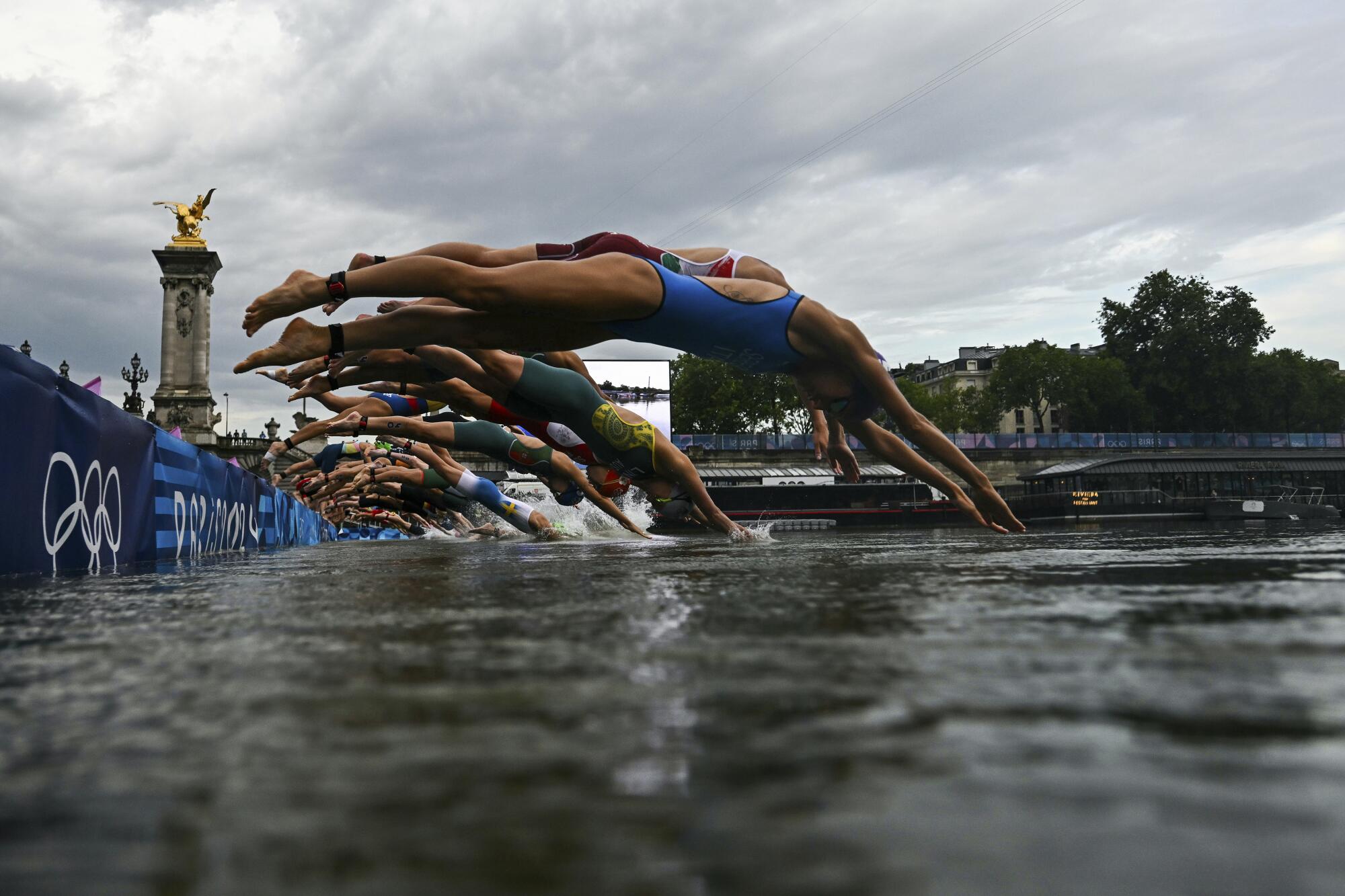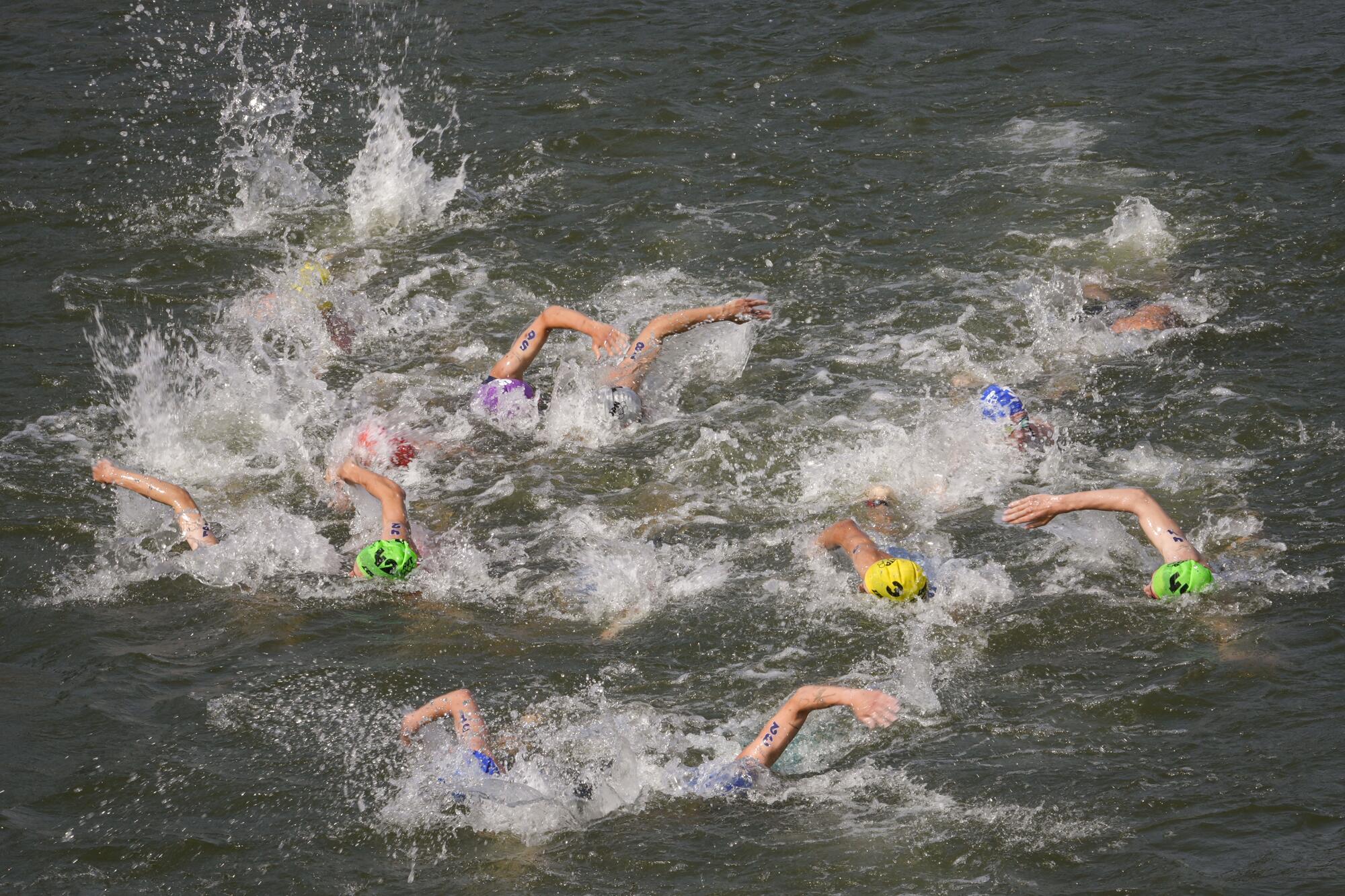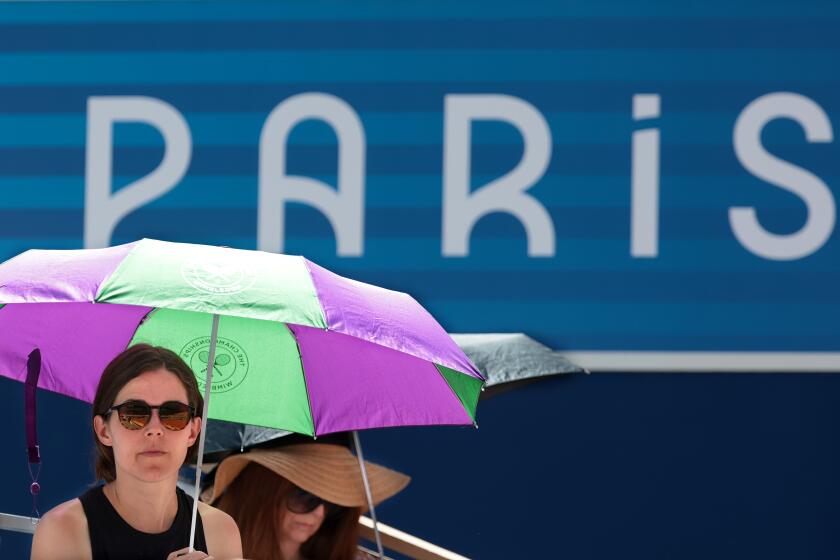
- Share via
PARIS — People have been living along the Seine for more than 3,000 years and they’ve been dumping trash, human waste and whatever else they want to get rid of into the river for much of that time. Even Joan of Arc’s ashes were reportedly deposited there after she was burned at the stake in 1431.
So it should be no surprise that the river, which cuts through the center of Paris, is no longer pristine. But concerns about the water quality, which forced the men’s triathlon to be postponed a day, have lifted and now there’s a new worry ahead of Monday’s triathlon mixed relay and Thursday and Friday’s marathon swim events.
The currents.
“I got scared quite a few times because the current carried us away a lot. It wasn’t so easy to swim in the Seine,” Cassandre Beaugrand of France, winner of the women’s triathlon, said of the currents, which were nearly three times as strong as normal.
“The current was a lot stronger,” agreed New Zealand’s Hayden Wilde, the silver medalist in the men’s race. “It was technically the hardest swim we’ve ever done. Obviously you can see we were in there for a few extra minutes, so that was really tough.”
In the triathlon, the athletes swam just a mile in the river. The marathon swimmers will go more than six times as far, making both the currents and the bacteria levels in the water even bigger factors.
The Olympics have been here before, of course. Eight years ago in Rio de Janeiro, the open-water swimming events were held in Copacabana, near where a mutilated body washed up five weeks earlier. And that wasn’t the only thing in the water. With tons of trash and raw sewage from the city’s poor neighborhoods flowing directly into the bay, the waters were found to be up to 1.7 million times more dangerous than a U.S. beach.
In Paris, the Seine has played a major part in the city’s history and culture for centuries. Monet, Renoir, Seurat and other Impressionist and post-Impressionists of the 19th century all painted scenes depicting life along the river, although swimming in the Seine was banned a century ago and by the 1960s, the river was declared biologically dead.

So after being awarded the Olympics in 2017, the municipal government in Paris spent $1.5 billion to upgrade the ancient storm and wastewater infrastructure in the hopes and making the river safe again. And to prove it worked, Anne Hidalgo, the city’s mayor, took a dip in the river nine days before the opening ceremony.
Then the unseasonable summer rains came, pounding Paris and undoing much of that work. As in many European cities, the sewer system in the French capital captures both stormwater and wastewater, then routes it through treatment plants. Heavy rains can overwhelm that system, and when the sewer pipes reach capacity, the wastewater has nowhere to go but the river.
And it’s not just the rain that is the problem on stormy days. The clouds that come along with it block out the sun, preventing it from killing the harmful bacteria in the water.
After a one-day delay and much hand-wringing, the Seine was finally declared safe enough for the triathlon and the men’s and women’s competitions started less than three hours apart, with the water quality and the strong currents attracting much of the attention.
Scorching temperatures are taking a toll on Olympic athletes in Paris. What is the IOC doing to address the impact climate change is having on the Games?
“The strong current on the way back, that made it harder,” said Swizterland’s Julie Derron, the silver medalist in the women’s triathlon. “But other than that, it’s just normal water.”
Added Great Britain’s Alex Yee, the men’s champion: “I don’t feel ill at all. And I’m pretty confident that we’ll get a mixed relay ahead. They’ve done everything they could.”
But for South African triathlete Henri Schoeman, who paddled through the dirty water in Brazil to win a bronze medal in 2016, all the focus on the water in Paris was little more than an unwelcome distraction.
“All the talk was about the river, it wasn’t really about the athletes,” he told reporters. “It is a bit of a shame that there was a shadow on this whole river story. It is what it is. It’s part of the game and you have to adapt to it.”
More to Read
Go beyond the scoreboard
Get the latest on L.A.'s teams in the daily Sports Report newsletter.
You may occasionally receive promotional content from the Los Angeles Times.








